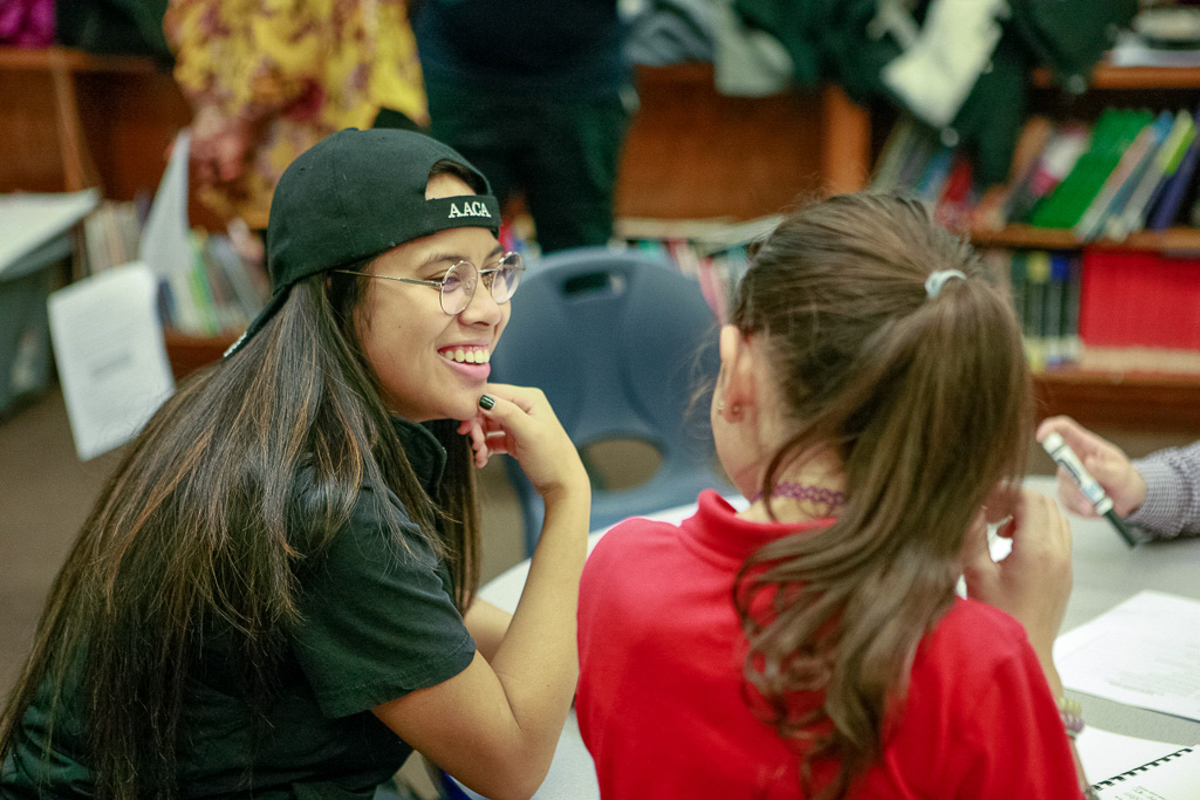 University students who volunteer with the Cities Project support youngsters through having fun together and by sharing coping, problem-solving and wellness strategies. (Photo courtesy of the Cities Project)
University students who volunteer with the Cities Project support youngsters through having fun together and by sharing coping, problem-solving and wellness strategies. (Photo courtesy of the Cities Project)
The path to a bright future begins with the support of others. St. Vincent de Paul learned this lesson early in life as he tutored young children and eventually trained people to become servant-leaders, both lay and religious. In doing this work, he benefited from the generosity of those who supported him and his mission. Today, out of the plethora of community engagement initiatives at DePaul, the Cities Project, a nonprofit collaboration between Chicago universities and Chicago Public Schools, stands out for its commitment to furthering Vincentian values.
Kathryn Grant, the founder of the Cities Project, grew up in São Paulo, Brazil. As a little girl, she watched children her age and younger begging for money at intersections while cradling babies.
“The inequality and poverty there is much more in-your-face and obvious there than it is here,” she says. “The shanty towns, or favelas, were right up against the wealthier parts of the city.”
After moving to the United States to pursue her studies, Grant began her journey toward creating the Cities Project in 1996 at DePaul University. A colleague had been asked to translate basic research findings about stress in children into interventions. In looking over the research, Grant and her coworkers uncovered a worrying pattern in how underprivileged youth are taught to manage anxieties.
“Our findings showed us that when children who grew up in beaten-down conditions were instructed to use individual-based active coping strategies typically recommended by therapists, they were less likely to work and even backfired,” Grant says. “The only way conventional strategies like these worked in high-stress situations were when kids had the support of an adult.”
After presenting such findings in 2008, the Cities Project team received a grant from the U.S. Department of Education. Researchers working on the project received other funding to further their work from the William T. Grant Foundation, the National Alliance for Research on Schizophrenia and Depression, the National Institute of Mental Health and the National Institute on Alcohol Abuse and Alcoholism. Researchers piloted the program in 2012.
Initially, Grant and her colleagues anticipated pairing children with members of their communities. However, they quickly realized that was easier said than done, due to the structure of underprivileged communities.
“We developed the intervention with a very active community advisory board that included more than 100 community leaders, school administrators, parents and students. They helped us understand that one of the most powerful ways that poverty, racism and inequality affect children is by reducing the number of adults in their lives,” Grant says. “Because of things like mass incarceration, chronic stressors that lead to poor health and early death, and lack of jobs, causing people to leave the community, the number of adults for every child is much smaller in low-resourced communities than in wealthier neighborhoods.”
Pairing children with college students overcame this hurdle. By partnering with students from DePaul, child participants would have supportive mentors from a variety of socioeconomic backgrounds and cultures. DePaul students, meanwhile, could gain a passion to make Chicago — and, by extension, the rest of the world — more equitable.
Student volunteers support mentees by sharing coping, problem-solving and wellness strategies. They also play board games, watch movies and participate in classroom activities, like show-and-tell.
In previous years, meetings between mentors and mentees took place in-person. However, the COVID-19 pandemic made it difficult to organize face-to-face interactions. Mentors used creative methods to keep students engaged. DePaul student Patrick Bogusz, for instance, relied on popular video games like Among Us, Minecraft and Roblox to foster stronger connections with his students while maintaining a fun and carefree atmosphere in meetings.
“I really enjoyed the free flow of our sessions and how focused they were,” he says.
Lily Goldstein, another volunteer from DePaul, taught her mentees about safe social media practices while getting them excited about community activism. Under her guidance, several students used apps like TikTok and Instagram to learn about and participate in advocacy projects.
“Youth have a powerful tool under their belt: the internet,” says Goldstein, who graduated this spring with a double major in psychology and sociology. “Social media allows them to reach their peers at any time and spread information.”
Grant and her colleagues hope to expand mentorship opportunities to students from more schools across Chicagoland, including the City Colleges of Chicago, Loyola University and Northwestern University. The Cities Project also plans to expand its other programs, such as the Mother-Daughter Project and the Stress and Learning Project, to guide the creation of future intervention development programs.
The Cities Project is largely led by undergraduate and graduate students. The organization is constantly looking for students, faculty and staff to become involved in research, communications and community engagement on behalf of the DePaul community. For more information about ways to support the program, visit
the Cities Project.